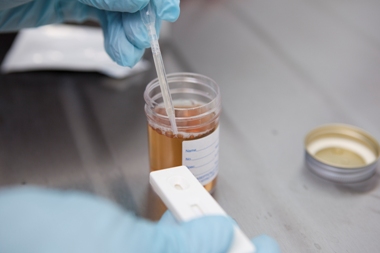Contracting cytomegalovirus (CMV) infection during pregnancy poses a risk to the developing baby, as some of these babies are born with permanent health problems. CMV is found in bodily fluids, including urine, saliva, blood, mucus and tears. It is spread through close contact with bodily fluids. The main way pregnant women catch CMV is from small children’s saliva and urine. So women who work with children, or who have a family already, need to be especially careful during pregnancy. For information about how to minimise this risk, click here.
Infections that can be transmitted to your baby
If you are infected with cytomegalovirus (CMV), toxoplasmosis or genital herpes during pregnancy, there is a chance that the infection might be transferred to your baby. Below are some simple ways to help protect yourself and your baby against these infections

The parasite that causes toxoplasmosis is found in the poo of infected cats and in infected meat. You can also catch it from soil that has been contaminated by cat poo.If it spreads to your baby it can cause serious complications including miscarriage, especially if you get infected early in pregnancy. For more information about toxoplasmosis, click here.
Genital herpes is a sexually transmitted infection.If you have genital herpes during pregnancy, there's a risk your baby could develop a serious illness called neonatal herpes; please alert your GP or midwife. Women whose first infection with herpes occurred before pregnancy can usually expect to have a healthy baby and a vaginal delivery because they will transfer protective antibodies to their baby during the pregnancy (unless the baby is born extremely prematurely). For more information about genital herpes, click here and for more information about neonatal herpes, click here.
- wash your hands before preparing food and eating
- wash hands, knives and chopping boards thoroughly after preparing raw meat
- wash fruit and vegetables thoroughly to get rid of any traces of soil
- wear gloves while gardening
- wear gloves while emptying cat litter trays and empty them every day
- wash your hands after touching a child’s urine or saliva. Wash your hands well for 15-20 seconds using soap and water.
- avoid eating raw or undercooked meat, or cured meats like salami or parma ham
- avoid drinking unpasteurised goat's milk or any products made from it
- do not touch or handle pregnant sheep or lambs
- do not put things in your mouth that have been in your child mouth. Try not to share food, cups or cutlery, or put your child’s dummy in your mouth
- avoid getting saliva from a baby/young child in your mouth. Try giving your child a kiss on the head instead of the on the lips.
- avoid vaginal, anal or oral sex if you or your partner have herpes blisters or sores, or a tingle or itch that means an outbreak is coming.
- avoid letting your baby be kissed by anyone who has an active cold sore



